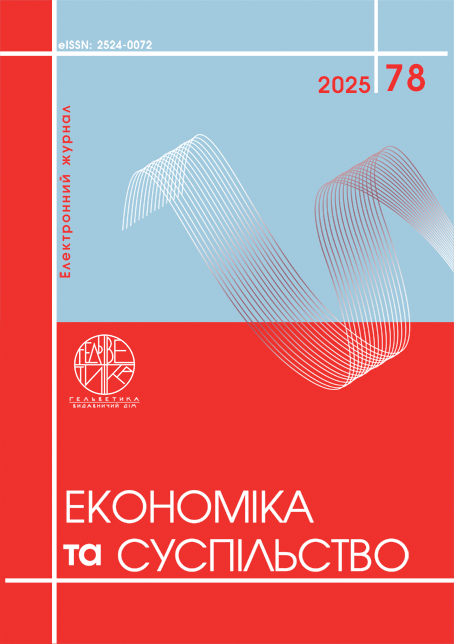RESOURCE POTENTIAL OF A DIGITAL UNIVERSITY IN THE CONDITIONS OF GLOBAL CHALLENGES
Abstract
The article is devoted to analyzing the transformation of the resource potential of a digital university in the conditions of global challenges and the development of digital technologies. It has been proven that the influence of artificial intelligence, big data analytics, virtual educational environments, and increased competition necessitate new models of functioning. The focus of the research is on the digital university as an institutional form that integrates classical resources (human, financial, material, infrastructural, and reputational) with digital assets, creating a multi-level system of sustainability and competitiveness. It has been shown that human and intellectual resources are enhanced by digital technologies, financial resources are diversified through online services, material resources are transformed into virtual infrastructure, and reputational resources are transformed into digital brands. Competition in such an environment manifests itself as a driver of efficiency and, at the same time, transforms into strategic cooperation. The combination of these processes creates conditions for the stability of the educational process, the development of partnership ecosystems, and the improvement of knowledge exchange efficiency. Recognition of the multi-stakeholder nature of educational services is seen as key to modernizing the resource base. Employers, research centers, industry partners, and international organizations are increasingly involved in their creation, leading to diversification of funding and integration into global networks. The practical significance of the results lies in their use for developing digital transformation strategies, modernizing management structures, and introducing innovative services that are useful for universities, educational projects, and government authorities.
References
Bobro, N. (2024). Digitalization and management of the modern educational process. The University of Technology in Katowice Press, pp. 12–24. https://doi.org/10.54264/M036
Soroko, D., Savino, G.L., & Gray, N. (2018). How can AI earn trust of system administrators in the IT-security domain? Conference acronym ‘XX, June 03–05, Woodstock, NY, 7 p.
Bobro, N.S. (2024). Innovative technologies in the organization of educational activities. XLIV-a Mizhnarodna naukovo-praktychna konferentsiia, June 7, 2024, pp. 161–164. https://doi.org/10.52058/45
Chala, N., Voropai, O., & Pichyk, K. (2021). Using data mining to create innovations in education. Sotsialno-ekonomichni problemy i derzhava, 25(2), pp. 21–28. https://doi.org/10.33108/sepd2022.02.021
Pomytkina, L., Gudmanian, A., Kovtun, O., & Yahodzinskyi, S. (2020). Personal choice: strategic life decision-making and conscience. E3S Web of Conferences, 164, p. 10021. https://doi.org/10.1051/e3sconf/202016410021
Strigul, M., Khomeriki, O., Yahodzinskyi, S., Romanenko, Y., Semenets-Orlova, I., & Lyasota, L. (2019). Peculiarities of development and dynamics of economism and the commercialization of Ukrainian higher education. Preprints. https://doi.org/10.20944/preprints201902.0247.v1
Bilyk, V.V., Shpylova, V.O., & Kozynets, A.O. (2024). Akademichna chesnist ta yii vazhlyvist u vyshchii osviti: vplyv innovatsiinykh tekhnolohii [Academic integrity and its importance in higher education: The impact of innovative technologies]. Ukrainskyi zhurnal prykladnoi ekonomiky ta tekhniky, 9(3), pp. 10–15. https://doi.org/10.36887/2415-8453-2024-3-1
Kozynets, A. (2024). Motyvatsiinyi mekhanizm upravlinnia diialnistiu pratsivnykiv u zakladakh vyshchoi osvity [Motivational mechanism of activity management of employees in higher education institutions]. Uspikhy i dosiahnennia u nautsi, 9(9). https://doi.org/10.52058/3041-1254-2024-9(9)-583-592
Lopushnyak, H.S., & Skydan, M.I. (2022). Transformatsii rynku pratsi i vyshchoi osvity Ukrainy v umovakh suchasnykh vyklykiv [Transformations of the labor market and higher education of Ukraine under modern challenges]. Sotsialna sfera: vyklyky ta novatsii. Zelena ekonomika, p. 8.
Soroko, D., Savino, G.L., Gray, N., & Schöning, J. (2023). Social transparency in network monitoring and security systems. Proceedings of the 22nd International Conference on Mobile and Ubiquitous Multimedia, pp. 37–53. https://doi.org/10.1145/3626705.3627773
Bobro, N. (2025). Use of digital avatars in the learning process as a factor of economic efficiency. International Scientific Conference “Economic Transformation in the Context of Global Challenges: Current Issues”: Conference Proceedings (February 7–8, 2025, Klaipeda, Lithuania), 7–10. https://doi.org/10.30525/978-9934-26-529-7-3
Bobro N. Digitalization and management of the modern educational process. The University of Technology in Katowice Press. 2024. С. 12–24. DOI: https://doi.org/10.54264/M036.
Soroko D., Savino G.L., Gray N. How can AI earn trust of system administrators in the IT-security domain? Conference acronym ‘XX, June 03–05, 2018, Woodstock, NY. 7 р.
Bobro N.S. Innovative technologies in the organization of educational activities. XLIV-а Міжнародна науково-практична конференція. 07 червня 2024 р. С. 161–164. DOI: https://doi.org/10.52058/45
Chala N., Voropai O., Pichyk K. Using data mining to create innovations in education. Соціально-економічні проблеми і держава. 2021. Vol. 25, № 2. С. 21–28. DOI: https://doi.org/10.33108/sepd2022.02.021
Pomytkina L., Gudmanian A., Kovtun O., Yahodzinskyi S. Personal choice: strategic life decision-making and conscience. E3S Web of Conferences. 2020. Vol. 164. P. 10021. DOI: https://doi.org/10.1051/e3sconf/202016410021
Strigul M., Khomeriki O., Yahodzinskyi S., Romanenko Y., Semenets-Orlova I., Lyasota L. Peculiarities of development and dynamics of economism and the commercialization of Ukrainian higher education. Preprints. 2019. DOI: https://doi.org/10.20944/preprints201902.0247.v1
Білик В.В., Шпильова В.О., Козинець А.О. Академічна чесність та її важливість у вищій освіті: вплив інноваційних технологій. Український журнал прикладної економіки та техніки. 2024. Т. 9, № 3. С. 10–15. DOI: https://doi.org/10.36887/2415-8453-2024-3-1
Козинець А. Мотиваційний механізм управління діяльністю працівників у закладах вищої освіти. Успіхи і досягнення у науці. 2024. № 9(9). DOI: https://doi.org/10.52058/3041-1254-2024-9(9)-583-592
Лопушняк Г.С., Скидан М.І. Трансформації ринку праці і вищої освіти України в умовах сучасних викликів. Соціальна сфера: виклики та новації. Зелена економіка. 2022. С. 8.
Soroko D., Savino G.L., Gray N., Schöning J. Social transparency in network monitoring and security systems. Proceedings of the 22nd International Conference on Mobile and Ubiquitous Multimedia. 2023. P. 37–53. DOI: https://doi.org/10.1145/3626705.3627773
Bobro N. Use of digital avatars in the learning process as a factor of economic efficiency. International Scientific Conference “Economic Transformation in the Context of Global Challenges: Current Issues”: Conference Proceedings (February 7–8, 2025, Klaipeda, Lithuania). 2025 P. 7–10. DOI: https://doi.org/10.30525/978-9934-26-529-7-3
Copyright (c) 2025 Наталія Бобро

This work is licensed under a Creative Commons Attribution 4.0 International License.


